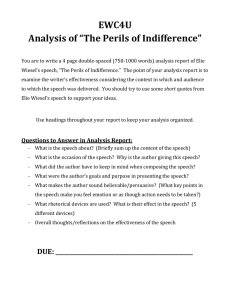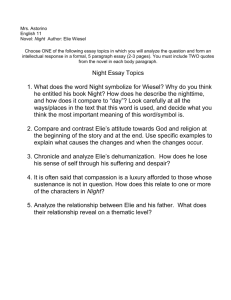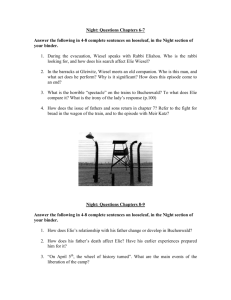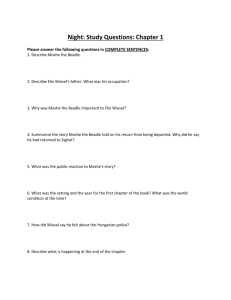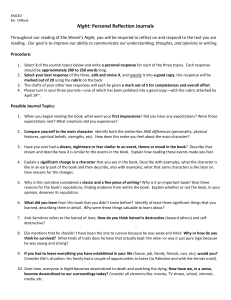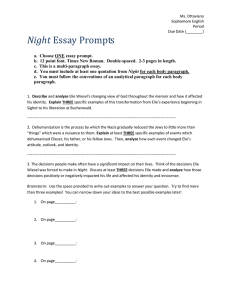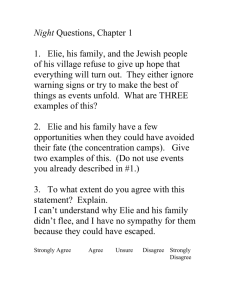File
advertisement
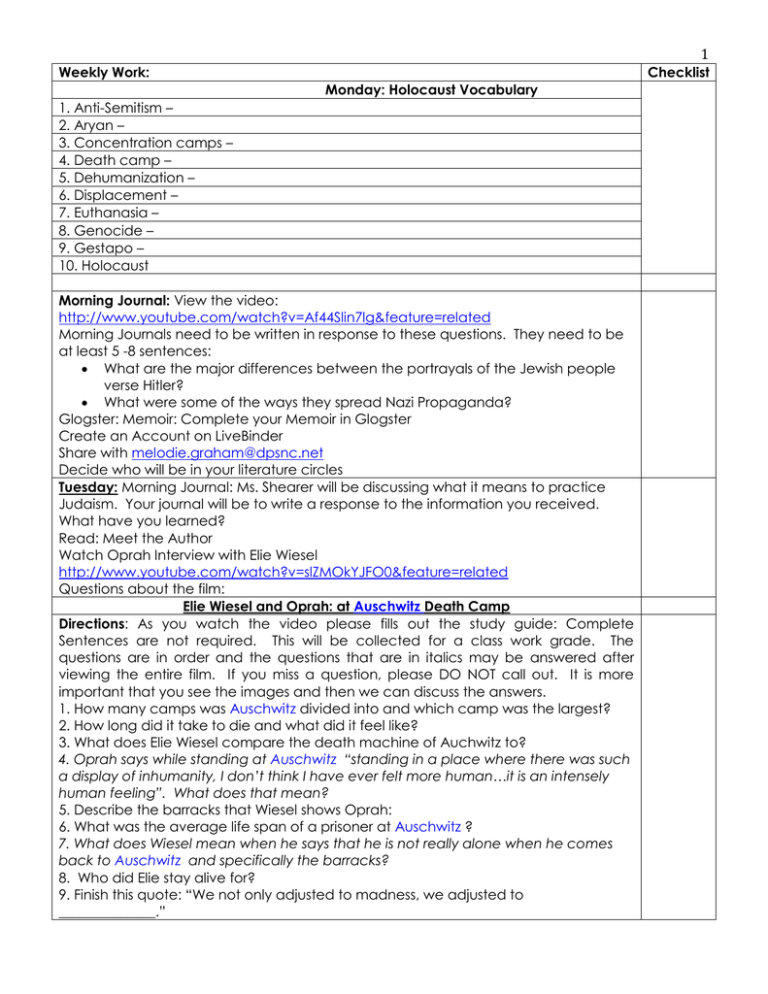
1 Weekly Work: Checklist Monday: Holocaust Vocabulary 1. Anti-Semitism – 2. Aryan – 3. Concentration camps – 4. Death camp – 5. Dehumanization – 6. Displacement – 7. Euthanasia – 8. Genocide – 9. Gestapo – 10. Holocaust Morning Journal: View the video: http://www.youtube.com/watch?v=Af44Slin7lg&feature=related Morning Journals need to be written in response to these questions. They need to be at least 5 -8 sentences: What are the major differences between the portrayals of the Jewish people verse Hitler? What were some of the ways they spread Nazi Propaganda? Glogster: Memoir: Complete your Memoir in Glogster Create an Account on LiveBinder Share with melodie.graham@dpsnc.net Decide who will be in your literature circles Tuesday: Morning Journal: Ms. Shearer will be discussing what it means to practice Judaism. Your journal will be to write a response to the information you received. What have you learned? Read: Meet the Author Watch Oprah Interview with Elie Wiesel http://www.youtube.com/watch?v=slZMOkYJFO0&feature=related Questions about the film: Elie Wiesel and Oprah: at Auschwitz Death Camp Directions: As you watch the video please fills out the study guide: Complete Sentences are not required. This will be collected for a class work grade. The questions are in order and the questions that are in italics may be answered after viewing the entire film. If you miss a question, please DO NOT call out. It is more important that you see the images and then we can discuss the answers. 1. How many camps was Auschwitz divided into and which camp was the largest? 2. How long did it take to die and what did it feel like? 3. What does Elie Wiesel compare the death machine of Auchwitz to? 4. Oprah says while standing at Auschwitz “standing in a place where there was such a display of inhumanity, I don’t think I have ever felt more human…it is an intensely human feeling”. What does that mean? 5. Describe the barracks that Wiesel shows Oprah: 6. What was the average life span of a prisoner at Auschwitz ? 7. What does Wiesel mean when he says that he is not really alone when he comes back to Auschwitz and specifically the barracks? 8. Who did Elie stay alive for? 9. Finish this quote: “We not only adjusted to madness, we adjusted to ______________.” 2 10. What did Elie and Oprah speak about becoming a privilege while in the death camps? After witnessing the video, take 5 minutes to write down your thoughts about what you saw. This is your personal reaction to the film: Homework: Read Foreword to the Reader Wednesday: Predict what you are about to read based on the following quote: "I wanted to come back to Sighet to tell you the story of my death. So that you could prepare yourselves while there was still time. To live? I don't attach any importance to my life any more. I'm alone. No, I wanted to come back, and to warn you. And see how it is, no one will listen to me." - Elie Wiesel, Night, Ch. 1 Literature Circle: With your group begin reading according to the rules of the Literature Circle 1. Individual: read the assigned chapter. 2. Individual: fill in the four points you’re responsible for in the chapter. 3. Small group discussion: group members report in to the group, DD leads discussion, and each member takes notes in the appropriate boxes. 4. Group: report your group’s findings in a full class discussion; add other groups’ responses to your ‘Discussion Notes’. Each Day one Group will LEAD the class discussion and receive points on their ability to lead. Thursday: Daily Journal: Foreshadowing: Choose Two of these and explain how they are examples of foreshadowing: Foreshadowing takes place throughout the novel, but is a bit different because the novel is told an autobiography told in a memoir-style of writing. The audience knows before even starting the novel that Eliezer will go to a concentration camp and survive. 1. Moshe the Beadle’s witness of the horrors of his deportation isn’t believed. (4- 5) 2. Sense of impending doom as the townspeople refuse to believe that the occupying Germans will harm them. (6-9) 3. Those waiting for deportation are denied water, a basic necessity of human survival. (14) 4. “An open tomb.” (15) Literature Circle: With your group begin reading according to the rules of the Literature Circle 1. Individual: read the assigned chapter. 2. Individual: fill in the four points you’re responsible for in the chapter. 3. Small group discussion: group members report in to the group, DD leads discussion, and each member takes notes in the appropriate boxes. 4. Group: report your group’s findings in a full class discussion; add other groups’ responses to your ‘Discussion Notes’. Each Day one Group will LEAD the class discussion and receive points on their ability to lead. Friday: Daily Journal: Using Prior Knowledge and Context Clues Below are the sentences in which the vocabulary words appear in the text. Read the sentence. Use any clues you can find in the sentence combined with your prior knowledge, and write what you think the underlined words mean on the lines provided. 3 1. They called him Moshe the Beadle, as though he had never had a surname in his life. 2. Nobody ever felt embarrassed by him. Nobody ever felt encumbered by his presence. 3. He was a past master in the art of making himself insignificant, of seeming invisible. 4. I was twelve. I believed profoundly. During the day I studied the Talmud, and at night I ran to the synagogue to weep over the destruction of the Temple. 5. The train full of deportees had crossed the Hungarian frontier and on Polish territory had been taken in charge by the Gestapo. 6. At that time, it was still possible to obtain emigration permits for Palestine. 7. With some of my schoolmates, I sat in the Ezra Malik gardens, studying a treatise on the Talmud. 8. My father was telling them anecdotes and expounding his own views on the situation. 9. At dawn, there was nothing left of this melancholy. Complete Reading/Questions/Building Connections with Literature Circles: You should have 3 Literature Circle Handout Collectors to turn in the week from your group. Questions Chapter One: 1. Write an example of a simile found on page 1. 2. What happens to Moshe the Beadle? 3. Summarize the story Moshe the Beadle told on his return from being deported. Why did he say 4. What kind of position does Elie’s father have in the community? 5. What kind of relationship do Elie and his father have at the beginning of the novel? 6. Where are the Jews sent first after the arrival of the German soldiers? 7. Provide an example of a simile and a metaphor from page 15. 8. What motto was inscribed on the plaque at Auschwitz, and what did it mean Chapter Two Questions: 1. What news do they then receive of where they are to be located? 2. How many people ride on each train car? 3. What does Madame Schachter imagine she sees? 4. Name the literary device Madame Schachter’s “vision” is an example of. Chapter Three Questions: 1. What happens to Elie’s family when they reach the camp? 2. What advice do Elie and his father receive from one of the camp prisoners? 3. What occupation does Elie say he is? 4. What happens to those who are skilled workers? 5. Write an example of a metaphor found on page 34. 6. What do Elie and the others recite as they are nearing the crematory? 7. What new name does Elie receive at the camp? Chapter 4 1.What happens to people with gold teeth or crowns? 2.What type of treatment do the men receive at the factory? 3. How does Elie manage to keep some of his teeth temporarily? 4. What happens to people who disobey the rules of the camp? 5. Why does the hanging of the “pipel” stay in Elie’s mind? Remember: 4 STEP THREE: Student Selection (55 POINTS EACH) You will choose one of these to complete. Remember you have two total to do. One must be individual so make sure you choose which week you want to work together and which week will be group. PROJECT CHOICE: #1: Individual: Persuasive Essay On Yom Kippur, the Day of Atonement, Jews traditionally fast to show God that they are sorry for their sins and to ask forgiveness. Only those over the age of thirteen and those who are healthy must fast. The imprisoned Jews discuss whether or not fasting is appropriate under the life or death conditions of the camp. Write a short essay on whether the prisoners should fast, give examples from the book to support your ideas as well as exampled from your own personal experience with fasting. PROJECT CHOICE #2: Individual or Group: Science Connection Wiesel says he had become “a starved stomach.” Estimate how much food a fifteenyear-old needs to thrive and grow based on medical or diet website/books/articles that you review. Read about calories as a measure of energy consumed and expended. Identify caloric amounts in some common foods. Make a list of what Wiesel may have eaten on any given day. Determine how many calories Wiesel was consuming a day and compare his diet to that of an average fifteen-year-old. PROJECT CHOICE: #3: Group Only: Literature Groups Throughout chapters 3-5, Wiesel uses language related to death, darkness, night, and decay to convey the horrors around him. In your groups, divide up the section’s text. Reread to identify examples of this recurring language. Then discuss the images this language evokes. Create some simple drawings of these images and exchange them with group members. FOR WEEK ONE YOU MUST SELECT ONE OF THESE ABOVE
